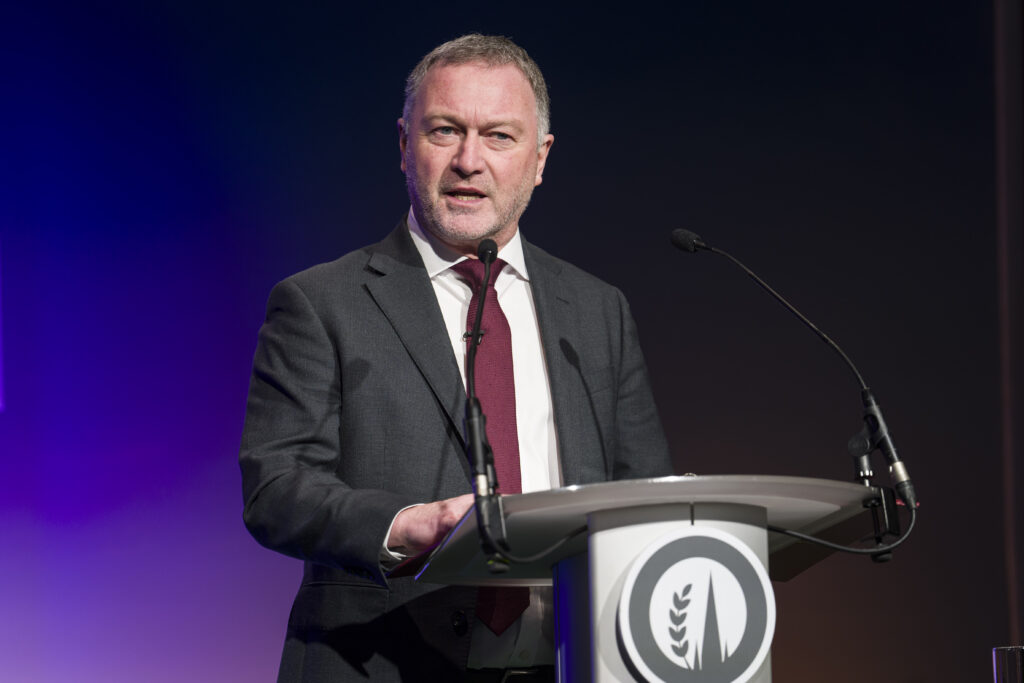Defra Secretary Steve Reed told the Oxford Farming Conference he was ‘sorry’ about the shock caused by the government’s inheritance tax reforms, as protesting farmers outside the venue attempted to drown out his speech.
However, he gave no indication that the government is planning to look again at the controversial reforms to agricultural property relief (APR).
Opening the conference, he said the government was forced to act because of the financial black hole it inherited in July, and said farming’s problems were far wider than the APR reforms. These include a fundamental lack of profitability that he was trying to address with a long-term plan, Labour’s New Deal for Farming, unveiled at the conference.
“When farmers came to protest in Westminster last year, it wasn’t just about tax.
Too many rural communities feel misunderstood, neglected and disrespected by politicians over many, many years,” he said.
“Farms are battling volatile input costs and tight margins. Imbalances in the supply chain are preventing fair returns for the food farmers produce.
“A shortage of skilled workers is putting the brakes on growing farm businesses. Farmers spend long hours in the fields, followed by an evening of paperwork. There are growing concerns about more extreme weather.
“The promised continuing access to European markets after Brexit was broken. Other trade deals have undercut British farmers. The straws are piling up and up – and the camel’s back is close to breaking.”
 As he spoke, the volume from a parade of tractors lined up outside the conference venue in protest at the Budget reforms was ratcheted up, providing a noisy backdrop.
As he spoke, the volume from a parade of tractors lined up outside the conference venue in protest at the Budget reforms was ratcheted up, providing a noisy backdrop.
Mr Reed continued, highlighting, again, ‘the £22 billion pound black hole left by the Conservatives’, which he said was bigger than anybody could have expected.
“Our planning in opposition was done without knowledge of a hidden financial black hole greater than the cost of the entire police service in England and Wales. It meant we had to take immediate tough decisions across the economy to balance the books, including on APR,” he said.
“We were shocked by the size of the black hole we were left to fill. I’m sorry if some of the action we took shocked you in return.
“But stable finances are the foundation of the economic growth needed to get the economy growing again after it flatlined through a decade of chaos.”
Asked about the impact of the reforms by delegates after his speech and by journalists in a subsequent press conference, Mr Reed sought to bat away the questions by pointing to these bigger issues affecting farming and suggesting his priority was to increase profitability within farming. In response to a question by Pig World and others, he made it clear the government had no intention of tweaking the policy to ease the impact on family farms and generally make it more workable.
Farming roadmap
Beyond the APR issue, there were some potentially significant policy announcements and aspirations, as part of Labour’s farming roadmap.
Supply chain fairness: He confirmed the government will introduce new rules for the pig sector this spring ‘to ensure contracts clearly set out expectations and only allow changes if agreed by all parties’.
“Risks and rewards are not spread evenly across the food chain,” he said. “We will act on supply-chain fairness so food producers and growers aren’t forced to accept unfair contracts.
“Regulations for the milk sector are in place, those for eggs and fresh produce will follow, and we’re working with all sectors to intervene where needed to guarantee fairness.”
Public procurement: In its manifesto, the government committed to use its purchasing power to back British produce, with an ambition for 50% of food in hospitals, army bases and prisons to be local or produced to high environmental standards.
Mr Reed announced that, for the first time, Government will now monitor where food bought by the public sector comes from, ‘the critical first step in helping the public estate buy more British food, and ensuring farmers get a fairer share of the £5 billion pounds a year spent on public-sector catering contracts’.
New EU veterinary agreement: He said the New Deal will ‘tear down the barriers to trade with a new veterinary agreement with the EU to get food exports moving again’.
“We will expand global trade opportunities, like increasing access for UK pork exports to China worth an additional £80 million pounds a year. And uphold and protect our high environmental and animal welfare standards in future trade deals,” he said.
Precision technology: Mr Reed said the government will introduce secondary legislation to Parliament by the end of March, unlocking new precision breeding technology that will allow farmers to grow crops that are ‘more nutritious, resistant to pests and disease, resilient to climate change and benefit the environment’. There was, however, no mention of the use of the technology in livestock, which is of interest to the pig sector, with, for example, the development of PIC’s PRRS-resistant pigs.
Planning: Mr Reed said he was working with Deputy Prime Minister Angela Rayner to ensure farmers and rural businesses benefit from the ‘biggest planning reform in a generation’.
In spring, the government will consult on national planning reforms to make it ‘quicker for farmers to build farm buildings, barns and other infrastructure they need to boost their food production’. The government will shortly begin a series of planning roundtables with the sector, he added.
“Planning rules have got in the way for too long. We will speed up the system so you can grow and diversify your business. Like chicken producers who want a larger shed to boost the amount of food they produce,” he said.
“We will ensure permitted development rights work for farms so they can convert larger barns into a farm shop, a holiday let, or sports facility. And we will support farms to reduce water and air pollution, through improved slurry stores or anaerobic digesters that can lower business costs and increase resilience, or build small reservoirs to provide an extra water supply for crop irrigation.”
Partnership
“The road map won’t exist in isolation. We will work in partnership with farmers, growers, manufacturers, processors, supermarkets, and all those across a fairer supply chain, to shape a long-term plan for the future of farming,” he said.




